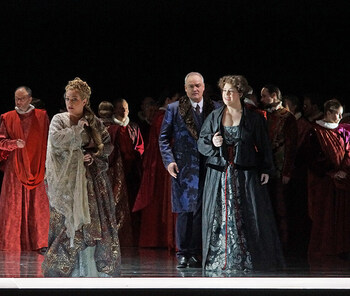Giuseppe Verdi
Premiere 22. October 2021
Performed in Italian with German and English supertitles
Piece-Info
The Spanish royal court is gripped by an icy coldness: For reasons of politics, the heir to the throne, Don Carlo has lost his bride Elisabetta to his father, the Spanish king. The crown prince is also thwarted in his political ambitions. The king, on the other hand, is powerless against the fiercely devout Grand Inquisitor. It seems that only Carlos’s friend Rodrigo can break free of these political and private constraints. But his bold dream of freedom leads to catastrophe. Giuseppe Verdi explores his great theme, the incompatibility of politics and private happiness, through almost all the characters in this opera, which premiered in 1867. For modern audiences it paints an oppressively topical social panorama. In cooperation with the Salzburg Easter Festival, the Semperoper presents »Don Carlo« in the four-act Italian version of 1884, supplemented by a new instrumental prologue by composer Manfred Trojahn, which sets up the background to the drama.
The Spanish heir to the throne Don Carlos is supposed to marry the French princess Elisabeth of Valois to seal the peace between the two countries after a long war. They meet one another in the Forest of Fontainebleau and fall in love, without initially knowing one another. Meanwhile, the royal houses have decided that the King of Spain, Philip II, will marry the princess himself. Elisabeth is brought to Spain.
Act One
Monks pray for the dead Emperor Charles V, who once voluntarily relinquished his power to his son Philip. In remembrance of his grandfather, Don Carlos attempts to overcome his love for his new stepmother. Carlos confesses his dangerous love to his friend Rodrigo, Marquis of Posa. Posa convinces him to take up the cause of the provinces of Flanders, whose inhabitants are being violently oppressed as rebels and heretics, instead of yearning for Elisabeth. When Carlos has to watch King Philip lead his new wife to the altar, he realises the hopelessness of his love and promises Posa that he will support him in the matter of Flanders. Princess Eboli whiles away the time for Queen Elisabeth’s ladies-in-waiting by singing a Moorish song. Rodrigo is able to secretly persuade Elisabeth to meet Carlos. Carlos asks her to request his father to send him to Flanders. However, after a few sentences, he loses himself in declarations of love. Elisabeth urges him to control himself and rejects him. No sooner has Carlos rushed away than the King appears with his entourage. As he finds the Queen alone, against all the rules of the court, he banishes her closest lady-in-waiting. The Marquis of Posa has attracted the King’s attention as the only one who has never yet asked for a royal favour, so the King seeks conversation with him. Posa uses the opportunity to describe the poor conditions in Flanders to the King and beseeches the King to grant his subjects more freedom. Philip is impressed by his outspokenness and gives Posa a task: he must find out whether Elisabeth still loves Carlos. He also warns his new favourite of the power of the Inquisition.
Act Two
Don Carlos waits for Elisabeth in a garden. He thinks that he recognises his beloved in a veiled woman, but the woman under the veil is actually Princess Eboli, who believes the Carlos is in love with her. Shocked, Carlos recognises the princess, who instantly understands who it was that Carlos had been longing for in her place. Posa, who wants to save the situation, warns Eboli not to abuse her knowledge, but she reveals to Carlos that Posa is now the King’s confidant. Nevertheless, Posa is able to persuade the prince to entrust his confidential letters to him as a precaution. At a large auto-da-fé, the court, the Church and the people gather to celebrate the condemnation of heretical thinking. A delegation from Flanders asks for clemency for the provinces. Don Carlos publicly requests the King to make him the governor there. When the King refuses, he draws his weapon against his father. Posa is the only one who dares to disarm the heir to the throne. The auto-da-fé runs is course.
Act Three
King Philip broods about his wife, who has never loved him, and about the powerlessness of a lonely king. He has the Grand Inquisitor summoned, who reminds the King of his duty to punish his rebellious son for the good of the kingdom and the Church and to hand Posa over to the Inquisition. – Elisabeth complains to Philip that a jewel casket from her bed chamber has been stolen. She does not suspect that Eboli has stolen the jewel casket and given it to the King. Philip shows his wife a portrait of Carlos that he has found in it and harangues her with his jealously until Eboli and Posa hurry to the Queen’s aid. Eboli remorsefully confesses all her intrigues and her own relationship with the King to the Queen. Elisabeth banishes her from the court. – Posa visits Carlos in prison. He firmly believes that he will be arrested and executed as Carlos’ incriminating documents have been found on him. There, he is shot down from behind. Dying, Posa beseeches his friend to fight for the rights of Flanders. Philip wants to reconcile with his son, but Carlos rejects him as a murderer. Led by the reformed Eboli, the rebelling people push into the prison to free Don Carlos. The Grand Inquisitor suddenly appears and subdues the rebellion.
Act Four
Elisabeth waits for Don Carlos at the tomb of Charles V. Together, they remember their first meeting in Fontainebleau. Elisabeth encourages Carlos to go to Flanders and to fight for freedom there. Then the King appears and has his son arrested by the Inquisition. But a mysterious monk, in whom Philip thinks that he recognises the late Emperor, takes the heir to the throne with him.
Gallery
Don Carlo













